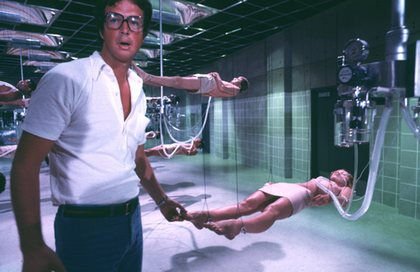It’s possible I could read a better book during the rest of 2015 than Yuval Noah Harari’s Sapiens: A Brief History of Humankind, but I wouldn’t bet on it. Edge.org made my day as it often does with “Death Is Optional,” a dialogue between the Israeli historian and the psychologist Daniel Kahneman, another great thinker. Harari argues (as I have here many times) that computer consciousness is nowhere near a reality, but that Weak AI can displace and disrupt us regardless. The two consider the road ahead, a highly automated tomorrow in which medicine, even death, may not be an egalitarian affair (though it never was completely). An excerpt:
Daniel Kahneman:
Do you get to a broader view by becoming more differentiated, that is, by having more detailed views? Or is it just that you get people to consider a possibility that wouldn’t occur to them?
Yuval Noah Harari:
Mainly, the second way. The main thing, and my main task as a historian is to get people to consider the possibilities which usually are outside their field of vision, because our present field of vision has been shaped by history and has been narrowed down by history, and if you understand how history has narrowed down our field of vision, this is what enables you to start broadening it.
Let me give you an example that I’m thinking about a lot today, concerning the future of humankind in the field of medicine. At least to the best of my understanding, we’re in the middle of a revolution in medicine. After medicine in the 20th century focused on healing the sick, now it is more and more focused on upgrading the healthy, which is a completely different project. And it’s a fundamentally different project in social and political terms, because whereas healing the sick is an egalitarian project … you assume there is a norm of health, anybody that falls below the norm, you try to give them a push to come back to the norm, upgrading is by definition an elitist project. There is no norm that can be applicable to everybody.
And this opens the possibility of creating huge gaps between the rich and the poor, bigger than ever existed before in history. And many people say no, it will not happen, because we have the experience of the 20th century, that we had many medical advances, beginning with the rich or with the most advanced countries, and gradually they trickled down to everybody, and now everybody enjoys antibiotics or vaccinations or whatever, so this will happen again.
And as a historian, my main task is to say no, there were peculiar reasons why medicine in the 20th century was egalitarian, why the discoveries trickled down to everybody. These unique conditions may not repeat themselves in the 21st century, so you should broaden your thinking, and you should take into consideration the possibility that medicine in the 21st century will be elitist, and that you will see growing gaps because of that, biological gaps between rich and poor and between different countries. And you cannot just trust a process of trickling down to solve this problem.
There are fundamental reasons why we should take this very seriously, because generally speaking, when you look at the 20th century, it’s the era of the masses, mass politics, mass economics. Every human being has value, has political, economic, and military value, simply because he or she is a human being, and this goes back to the structures of the military and of the economy, where every human being is valuable as a soldier in the trenches and as a worker in the factory.
But in the 21st century, there is a good chance that most humans will lose, they are losing, their military and economic value. This is true for the military, it’s done, it’s over. The age of the masses is over. We are no longer in the First World War, where you take millions of soldiers, give each one a rifle and have them run forward. And the same thing perhaps is happening in the economy. Maybe the biggest question of 21st century economics is what will be the need in the economy for most people in the year 2050.
And once most people are no longer really necessary, for the military and for the economy, the idea that you will continue to have mass medicine is not so certain. Could be. It’s not a prophecy, but you should take very seriously the option that people will lose their military and economic value, and medicine will follow.•
Tags: Daniel Kahneman, Yuval Noah Harari

